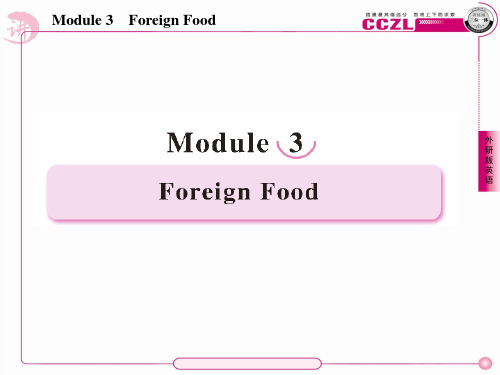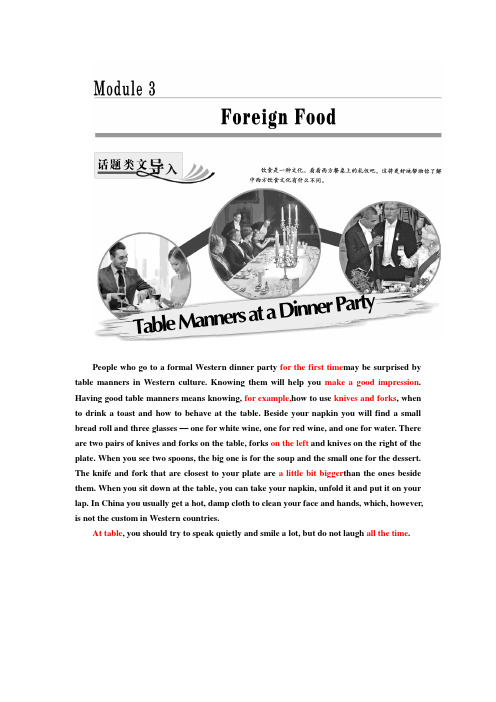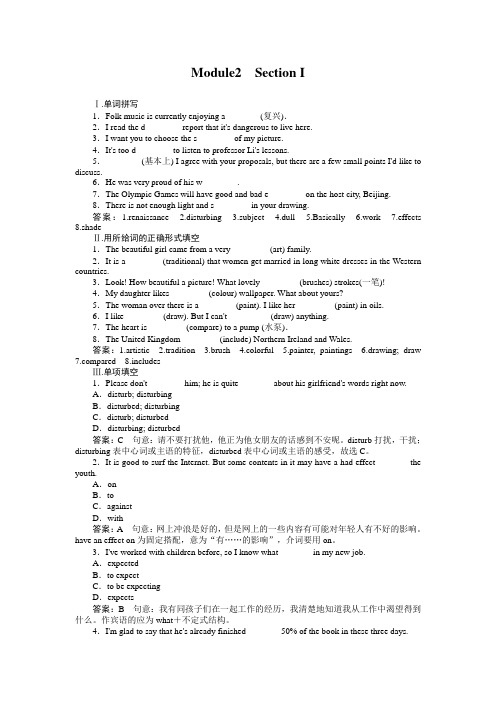高二英语选修8(外研版):3-1Introduction——Grammar(1)
高二英语选修8(外研版)课件:3-1Introduction——Grammar(1)

Module 3
Foreign Food
9.dessert n.[C,U](餐后的)甜食
In Britain you often have three courses: a starter(e.g. soup), a main course(e.g. steak or chicken), and a dessert (e.g. strawberries or ice cream). 在英国,(宴会)通常有三道菜:开胃菜(如汤)、主菜 (如牛排或鸡肉)和甜点(如草莓或冰激凌)。
Module 3
Foreign Food
外 研 版 英 语
Module 3
Foreign Food
外 研 版 英 语
Module 3
类别
话题
Foreign Food
课程目标要求掌握的项目
Foreign food, Chinese food and food in Australia owe, bakery, taste, obsess, requirement, fixed, complement, consequence, customer, delicacy, dessert, fence, manner, punctuation, chew, consume, entertain, mash, prepare, remark, transform, trend, abundant, ample, appetising, artificial, casually, justifiably, overhead end up, have...in common, in short, make out, no wonder, set fire to, what's more 1.But I was already so full that I could only watch as the banquet continued.
外研版高二英语选修8_外研版高二英语选修8_Module3_要点知识提炼

要点知识提炼1. What is food to one man may be poison to another.【重点知识】what引导主语从句,作may be 的主语。
例如:What we should do first is to raise money.【拓展知识】能够引导主语从句的除了what,还有who, whose, whether, whoever, whatever, which, whichever, when, where, wherever, why, how等。
2. To my surprise, more dishes arrived, plus soups, side dishes, and desserts.【重点知识】to my surprise“令我吃惊的是”为介词短语作状语,也叫插入语,引起后面的话题,常用逗号分开。
例如:To their surprise, the one they saw was not the actor, but her husband.【拓展知识】用于该结构的名词除surprise外还有joy, delight, disappointment, sadness, horror, fright等。
3. The first time I saw a three-year-old kid cheerfully chewing a chicken’s head I had bad dreams for weeks.【重点知识】chewing chicken’s head为现在分词短语作宾语补足语。
在英语中感官动词后可以接现在分词作宾补,表示动作正在进行。
这类动词有:see, watch, notice, observe, look at, listen to, hear, feel 等。
例如:We heard her singing in her room.【拓展知识】see, watch, notice, observe, look at, listen to, hear, feel 等感官动词后也可使用不带to 的不定式作宾语补足语,强调动作的结果,表示动作的全过程。
Introduction & Vocabulary外研选修8 module3

Before you read the passage, try to think about the following questions: 1) What kind of food is your favourite? 2) Can you tell the main difference between foreign and Chinese food? 3) Which do you prefer, foreign food or Chinese food? Why?
If you’re going to
America, bring your own food. Fran Lebowitz, American writer
You should eat to live, not live to eat.
Socrates, Greek philosopher
a piece of cake 小菜一碟 hot potato 烫手的山芋 put all eggs in one basket 把所有鸡蛋放 在一篮子里(比喻风险很大) bread and butter 面包和黄油(比喻谋生 的手段) apple of one’s eyes 掌上明珠(比喻某人最 喜欢的)
2. …, I started eating greedily. greed n. 贪食(尤指不饥饿时);贪心,
贪婪
greedy adj. 贪吃的,贪婪的,贪心的 greedily adv. n. their greed for power/wealth adj. look at the cakes with greedy eyes greedy for information 渴求 as greedy as a wolf / pig greedy/ thirsty for knowledge
外研版高中英语选修8全套PPT课件

重点句型
3. But the long Antarctica winter night, which lasts for 182 days (the longest period of continuous darkness on earth ), as well as the extreme cold and lack of rainfall,means that few types of plants can survive there.
句型探究
(1)but前的句子是not…until…句式的倒装句,原句为:The British explorer James Cook didn't cross the Antarctic Circle until the late 18th century. not until位于句首,句子要倒装。 not …until … 直到……才…… (2)在句型“主句+ until/till +时间状语从句”中,应注意以下几点: ①主句中动词是非延续性动词,如leave, graduate, break 等时,必须用否定形式。 ②主句中动词是延续性动词,肯定、否定形式都可以,但注意意义完全不同。
句型探究
We discussed the problem until he came back. 我们一直讨论这个问题直到他回来。 I will wait here until the concert is over. 我将一直在这儿等到音乐会结束。 Until he returns, nothing can be done. 他不回来什么也不能做。 Go straight on until you see a large building. 一直往前走,直到你看到一座大楼。
高中英语外研版选修8Module 3 Section Ⅰ Introduction

People who go to a formal Western dinner party for the first time may be surprised by table manners in Western culture. Knowing them will help you make a good impression. Having good table manners means knowing, for example,how to use knives and forks, when to drink a toast and how to behave at the table. Beside your napkin you will find a small bread roll and three glasses — one for white wine, one for red wine, and one for water. There are two pairs of knives and forks on the table, forks on the left and knives on the right of the plate. When you see two spoons, the big one is for the soup and the small one for the dessert. The knife and fork that are closest to your plate are a little bit bigger than the ones beside them. When you sit down at the table, you can take your napkin, unfold it and put it on your lap. In China you usually get a hot, damp cloth to clean your face and hands, which, however, is not the custom in Western countries.At table, you should try to speak quietly and smile a lot, but do not laugh all the time.Section_ⅠIntroduction_&_Reading_—_Pre-reading[原文呈现]Passage 1Chinese people think a lot about food. In fact, I think that they are sometimes obsessed①with it. My first experience of this aspect② of Chinese culture came at a banquet③ during a trip to Beijing in 1998. I had eaten Chinese food often, but I could not have imagined how fabulous a real Chinese banquet could be. The first six or seven dishes④ seemed to fill the table, with plates dangerously balanced⑤ one on top of another⑥. I thought this vast wave of food was the total number of dishes to be served⑦,and I started eating greedily⑧. Everyone else⑨ just tasted a bit of each dish and then put their chopsticks⑩ down, continuing to chat⑪. “They can't have very big appetites,” I thought.To my surprise⑫,more dishes arrived, plus soups, side dishes, and desserts⑬. There was enough to feed a whole army. No wonder⑭my fellow guests had had only a few bites of each dish; they knew what was still to come. But I was already so full that I could only watch as the banquet continued⑮.[读文清障]①obsess/əb'ses/v.使着迷be obsessed with/by着迷于②aspect n.方面③banquet/'bæŋkw It/n.宴会④dish/dIʃ/n.一道菜⑤balance v.使保持平衡,立稳balance ... on ...把……平稳地放在……上面⑥with plates ...是with复合结构,在句中作状语。
高二英语选修8(外研版):2-1Introduction——Grammar(1)

Module2 Section IⅠ.单词拼写1.Folk music is currently enjoying a________(复兴).2.I read the d________ report that it's dangerous to live here.3.I want you to choose the s________ of my picture.4.It's too d________ to listen to professor Li's lessons.5.________ (基本上) I agree with your proposals, but there are a few small points I'd like to discuss.6.He was very proud of his w________.7.The Olympic Games will have good and bad e________ on the host city, Beijing.8.There is not enough light and s________ in your drawing.答案:1.renaissance 2.disturbing 3.subject 4.dull 5.Basically 6.work7.effects 8.shadeⅡ.用所给词的正确形式填空1.The beautiful girl came from a very ________ (art) family.2.It is a ________(traditional) that women get married in long white dresses in the Western countries.3.Look! How beautiful a picture! What lovely ________ (brushes) strokes(一笔)!4.My daughter likes ________ (colour) wallpaper. What about yours?5.The woman over there is a ________(paint). I like her ________ (paint) in oils.6.I like ________ (draw). But I can't ________(draw) anything.7.The heart is ________ (compare) to a pump (水泵).8.The United Kingdom ________ (include) Northern Ireland and Wales.答案:1.artistic 2.tradition 3.brush 4.colorful 5.painter, paintings 6.drawing; draw pared8.includesⅢ.单项填空1.Please don't ________him; he is quite________about his girlfriend's words right now.A.disturb; disturbingB.disturbed; disturbingC.disturb; disturbedD.disturbing; disturbed答案:C句意:请不要打扰他,他正为他女朋友的话感到不安呢。
外研版高中英语选修8讲义Module 3 Section Ⅲ Grammar——定语及定语从句
Section ⅢGrammar——定语及定语从句考点一定语1.单词作定语的位置英语中单的形容词、数词、代词、普通格名词、分词、动名词和所有格等作定语(attribute)时,通常放在被修饰的词之前。
a stone building一座石头砌的建筑物faded flowers枯萎的花boiling water开着的水boiled water开水a gone case不可挽救的事John's house约翰的房子the risen sun升起的太阳the changed world已经变化了的世界the changing world正在变化中的世界2.短语作定语的位置英语中的分词短语(participial phrase)、不定式短语(infinitive phrase)、介词短语(prepositional phrase)、形容词短语(adjective phrase)和长度短语(length phrase)等,通常放在所修饰的词之后。
He had made a thorough study of all the dialects spoken in Scotland.他对苏格兰所有的方言都做了透彻的研究。
The woman holding a baby in her arms is waiting to see the doctor.那个抱着婴儿的妇女正等着医生看病。
It was a bolt from the blue.这真是个晴天霹雳。
On the top of the hill there is a pagoda about a hundred feet high.在山顶上有一座十丈高的宝塔。
This may not be the best book to start with.一开始就读这本书不一定最合适。
3.多个单词作定语的排列次序英语中两个或两个以上的单词作定语放在中心词前共同修饰一个名词,其基本次序是由小范围到大范围,由次要意义到主要意义,由程度弱到程度强,由一般到专有。
外研版高中英语选修八Module3SectionⅠ
(3)Translate the sentence into Chinese. But one thing I do admire is the polite manner in which British people eat,even if it is just a potato. 但__是__让_我__非__常__佩__服_的__是__英__国__人_吃__饭__的__举__止_,__哪____ 怕_ 仅仅是一个土豆,他们也会吃得斯斯文文。 ______________________________________ _
►Step Three:Careful reading 1.Listen to the tape and answer the following questions. (1)Which sentence in the passage is the closest in meaning to the following one? It was the first time I ate British food that I was in the canteen of a London publisher. _T_h_e_f_ir_s_t _ti_m_e__I _a_te_B__ri_t_is_h_f_o_o_d_I_w_a_s__in_t_h_e_____ _ca_n_t_e_e_n_o_f_a_L_o_n_d_o_n__p_u_b_li_sh_e_r_. ______________
(2)What impressed the writer most at the banquet? A.At first,everyone just tasted a bit of each dish. B.How bad a real Chinese banquet could be. C.The quantity of food served. D.He saw a kid cheerfully chewing a chicken’s head.
英语选修8知识点总结外研
英语选修8知识点总结外研In this article, we will provide a comprehensive summary of the key knowledge points covered in the English language teaching syllabus for the 8th grade, focusing on the topics of grammar, vocabulary, and language skills. The summary will include explanations, examples, and practical tips for students to improve their language proficiency and performance.1. GrammarGrammar is the foundation of language and plays a critical role in communication. It encompasses the structure of words, phrases, and sentences, and how they are used to convey meaning. In the 8th-grade English syllabus, students can expect to study a range of grammar topics, including:- Parts of speech: Students will learn about the different types of words in the English language, such as nouns, verbs, adjectives, adverbs, pronouns, prepositions, and conjunctions. Understanding the function and usage of each part of speech is essential for building coherent and effective sentences.- Sentence structure: Students will study the mechanics of sentence construction, including subject-verb agreement, tenses, and word order. They will also learn about different types of sentences, such as simple, compound, complex, and compound-complex sentences.- Punctuation: Proper punctuation is crucial for conveying meaning and clarity in writing. Students will be taught the rules for using punctuation marks, such as commas, periods, question marks, exclamation points, colons, semicolons, and quotation marks.- Verb forms: Understanding verb forms and tenses is essential for expressing actions and states of being accurately. Students will learn about regular and irregular verbs, as well as the different tenses and their uses in context.- Modifiers and parallelism: Students will study how modifiers, such as adjectives and adverbs, enhance the meaning of a sentence. They will also learn about parallelism, which involves using grammatical structures that are parallel in form and function within a sentence.2. VocabularyVocabulary refers to the set of words and phrases that a person knows and uses in their language. In the 8th-grade English syllabus, students will be introduced to a wide range of vocabulary topics, including:- Word roots, prefixes, and suffixes: Understanding the building blocks of words can help students decipher the meanings of unfamiliar words. By studying word roots, prefixes, and suffixes, students can expand their vocabulary and improve their reading comprehension.- Synonyms and antonyms: Students will learn about synonyms, which are words that have similar meanings, and antonyms, which are words that have opposite meanings. This knowledge can help students express themselves more precisely in both spoken and written communication.- Context clues: Students will be taught how to use context clues to infer the meanings of unfamiliar words while reading. Context clues can be found in the surrounding text and can provide valuable information about the intended meaning of a word.- Idioms and figurative language: Students will explore idiomatic expressions and figurative language, such as metaphors, similes, and personification. Understanding these elements of language is important for interpreting literary texts and communicating more expressively.- Domain-specific vocabulary: Students will encounter vocabulary related to specific subjects, such as science, history, and mathematics. Learning domain-specific vocabulary is essential for academic success and for understanding complex texts on specialized topics.3. Language SkillsLanguage skills refer to the ability to use language effectively in various contexts, such as speaking, listening, reading, and writing. In the 8th-grade English syllabus, students will develop and refine the following language skills:- Reading comprehension: Students will practice reading different types of texts, including fiction, nonfiction, poetry, and drama. They will learn strategies for understanding and interpreting the main ideas, themes, and literary elements present in the texts.- Writing skills: Students will work on improving their writing skills by learning how to compose different types of essays, such as narrative, expository, persuasive, and descriptive essays. They will also learn about the writing process, including prewriting, drafting, revising, editing, and publishing.- Speaking and listening: Students will engage in activities that focus on developing their speaking and listening skills, such as participating in class discussions, delivering presentations, and listening to and responding to spoken language.- Critical thinking and analysis: Students will be encouraged to think critically about the texts they read, analyze the author's purpose, and evaluate the evidence presented. They will also learn to express their ideas clearly and persuasively in both oral and written forms. In conclusion, the 8th-grade English syllabus covers a wide range of language knowledge points, including grammar, vocabulary, and language skills. By mastering these key areas of study, students can improve their language proficiency and become more effective communicators in both academic and real-world contexts. It is essential for students to practice and apply their language knowledge regularly in order to achieve success in their English studies.。
2020-202英语外研版选修8学案: 3 Grammar——定语和定语从句
Section ⅡGrammar——定语和定语从句[语法图解][典句感知]①I thought this vast wave of food was the total number of dishes to be served,and I started eating greedily.②Everyone else just tasted a bit of each dish and then put their chopsticks down, continuing to chat.③I still remember what I ate: a tuna fish and cheese sandwich.④Do you know the girl singing over there?⑤He is always the first person to leave the office.⑥One eveninghe was entertaining the ruler of a small island in thePacific.⑦However, there are other kinds of foods that have taken longer for me to accept.⑧But one thing I do admire is the polite manner in which British people eat, even if it is just a potato.⑨As we all know, Vladimir Putin was elected President of Russia a fourth time.⑩The menu included asparagus, which his guest had never eaten before.[语法领悟](1)①~⑥句中,黑体部分在句中均作定语,且①③句中作前置定语,②④⑤⑥作后置定语。
- 1、下载文档前请自行甄别文档内容的完整性,平台不提供额外的编辑、内容补充、找答案等附加服务。
- 2、"仅部分预览"的文档,不可在线预览部分如存在完整性等问题,可反馈申请退款(可完整预览的文档不适用该条件!)。
- 3、如文档侵犯您的权益,请联系客服反馈,我们会尽快为您处理(人工客服工作时间:9:00-18:30)。
Module 3 Section ⅠⅠ.根据句意和汉语提示写出下列单词1.We ________(应给予)a lot to our teachers.2.________(咀嚼)your food before you swallow it.3.He is so hungry that he begins to eat________(贪婪地).4.It is bad________(方式;方法)to stare at others.5.Xiao Wang is doing his best to meet the________(要求)of his parents.6.Some foreigners don't know how to eat dumplings, some of them throw the ________(馅)away.7.Elm trees(榆树)are very________(常见的)in my hometown.8.The students begin their classes at a ________(固定的)time.答案:1.owe 2.Chew 3.greedily 4.manners 5.requirements mon 8.fixed2.David________a girl he has just met.3.It________my principle. I don't want to do it.4.The dish isn't________.5.Tom, I think, has much________with Jack.6.If Tom goes on driving like that, he'll________dead.7.________,he met an old friend he hadn't seen for several years.8.In the darkness I couldn't ________who it was.答案:1.No wonder 2.is obsessed with 3.goes against 4.to her taste 5.in common 6.end up7.To his surprise8.make outⅢ.单项填空1.I think their success________more to careful management than to good luck.A.devotes B.reliesC.owes D.belongs答案:C句意:我认为他们的成功与其说归功于好的运气还不如说归功于精细的管理。
owe to“归功于”;devote to“献身于,致力于”;rely on“依靠,依据”;belong to“属于”。
2.________this cake and tell me whether you like it.A.Tasting B.To tasteC.Taste D.To have tasted答案:C句意:尝尝这块蛋糕,然后告诉我你是否喜欢。
祈使句+and+简单句,为固定表达方式。
3.After a 7-day visit to China, they________the delic ious Chinese food.A.are popular withB.are obsessed withC.are familiar withD.are stuck in答案:B句意:在对中国进行七天访问之后,他们简直对中国食物着了迷。
be popular with“受欢迎”;be obsessed with“对……着迷”;be familiar with“对……熟悉,通晓”;be stuck in“被困在……”。
4.He was always________for knowledge, and at last became an expert in the field of art.A.anxious B.greedyC.great D.grave答案:B句意:他总是渴求知识,最终成为了一位艺术领域的专家。
be greedy for“渴望;渴求”。
5.________that he has so much money; his father is a millionaire.A.Not wonderB.No wonderC.Not wonderingD.No wondering答案:B句意:怪不得他那么有钱,原来你父亲是个百万富翁。
no wonder“难怪;怪不得;不足为奇”。
6.It is possible that one day we will________disability, so we shouldn't look down upon the disabled.A.end up with B.put up withC.come up with D.catch up with答案:A句意为:可能将来的某一天我们也会变残疾,所以我们不应该瞧不起残疾人。
end up with“以……结束”;put up with“容忍”;come up with“提出”;catch up with“赶上”。
7.It's________to be rude to the old.A.no manner B.not mannerC.good manners D.bad manners答案:D句意:粗鲁地对待老人是没礼貌的。
“没礼貌”要用bad manners。
8.I could hear their voice, but I couldn't________what they are saying.A.make for B.make upC.make out D.make off答案:C本题考查短语辨析。
make for“促成”;make up“化妆”;make out“辨认出”;make off“迅速离开”。
根据句意:我能听见他们的声音,但是听不清他们在说什么。
可知C项正确。
9.________in the regulations that you should not tell other people the password of your e-mail account.A.What is requiredB.What requiresC.It is requiredD.It requires答案:C句意:规定中要求你不应告诉他人你的邮件账户密码。
分析句子结构可知:that引导的从句作主语。
it作形式主语;若选A项时that前应加is。
10.But if you go________nature and do things at the wrong time of year, you will have to do more work and the results will not be good.A.against B.onC.up D.down答案:A句意:如果你违背大自然,且在不当时间做事情,你就会事倍功半。
go against“违背;违反”。
11.Though they're twins, they have nothing in________with one________.A.commons; anotherB.common; anotherC.common; otherD.commons; other答案:B句意:尽管他们是双胞胎,但他们迥然不同。
have nothing in common没有一点儿共同之处;one another“互相,彼此”。
12.________he saw me, he looked shy.A.For the first timeB.The first timeC.When for the first timeD.First time答案:B句意为:他首次见我时看上去很羞涩。
第一个分句应该是一个状语从句,选项中只有the first time可引导状语从句,表示时间概念的名词短语也可引导状语从句,如the second, the moment, the instant, the minute等。
13.________his being late again, he lost his job and had to stay at home.A.Owing toB.As result ofC.In case ofD.Because答案:A owing to“因为;由于”;to为介词,后跟名词/代词/动名词作宾语。
14.Why! I have nothing to confess. ______ you want me to say?A.What is it thatB.What it is thatC.How is it thatD.How it is that答案:A本题考查的是强调句型。
强调部分为特殊疑问词what,因此,后面跟一般疑问语序,“为什么!我没什么好坦白的。
你到底想让我说什么?”15.We always keep ________ spare paper in case we run out.A.too much B.a number ofC.plenty of D.a good many答案:C spare paper在本句中意为“备用纸”;为不可数名词,因此排除B、D两项(只修饰复数名词);too much“充足的”,可修饰不可数名词,但其意思“太多的”不符合本句要求。
Ⅳ.根据课文内容填空Chinese people think a lot about food. I think that they are sometimes __1__with it. I had eaten Chinese food often, but I could not have imagined how fabulous a real Chinese banquet could be. The first six or seven dishes seemed to fill the table, with plates dangerously __2__one on top of another. To my surprise, more dishes arrived. There was enough to __3__a whole army. Another aspect of“food culture”is that the Chinese seem to eat almost every part of every animal—much to the __4__of many westerners. However, there are other kinds of foods that have taken longer for me to accept. The __5__choudoufu is an example.The first time I ate British food I was in the canteen of a London publisher. I was __6__at their easy and __7__manner. At the counter there were colourful mixtures in eight or nine big boxes. Later, I found out that British people like __8__food. But in China, cold food means __9__—you don't give it to a guest. I also learned that the English like to__10__food before serving it at the table. The food here goes against the Chinese sense of beauty and style at the dinner table. Chinese dishes can be photographed and have a nice appearance.答案:1.obsessed 2.balanced 3.feed 4.horror 5.infamous6.amazed7.graceful8.cold9.poverty10.mixⅤ.完成句子1.由于党的英明领导,我们去年取得了巨大的成就。
